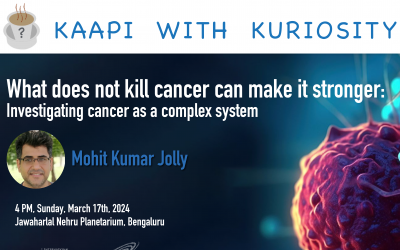Abstract:
Despite major advancements in past decades, cancer remains a formidable disease and claims millions of deaths per year. Two key processes underlie the clinical challenges of treating cancer – the ability of cancer cells to metastasize (spread from one organ to another) and to adapt efficiently when attacked with different therapies. These processes are driven by an intricate web of interactions among molecules within a cell and those among the tumour cells in their neighbourhood. I will discuss how quantitative mathematical models incorporating these interactions, in integration with experimental and clinical data, can improve our understanding of the dynamics of these processes. Our work highlights how these two processes can drive each other, thus indicating how residual cancer cells may aggravate the disease. The insights gained from such an interdisciplinary approach — creating ‘digital twins’ of cancer progression — can accelerate identifying new treatment strategies that can help us win some of the ongoing battles in our long-standing war against cancer.
About the Speaker:
Mohit is an Associate Professor in Bioengineering at IISc, Bangalore. He earned his Bachelors and Masters from IIT Kanpur and PhD from Rice University, all in Bioengineering, before moving to IISc in 2018. His research group works on developing computational models for cancer progression in close collaboration with experimental and clinical collaborators. His work in the physics of cancer has been recognized internationally; he was awarded the prestigious ICTP (International Center for Theoretical Physics) Prize 2023; and serves as the Editor-in-Chief at NPJ Systems Biology and Applications. He also received the 2016 iBiology Young Scientist Seminar Award for communicating his interdisciplinary research to a broad audience.
Supported by Arista Networks India Pvt. Ltd.



